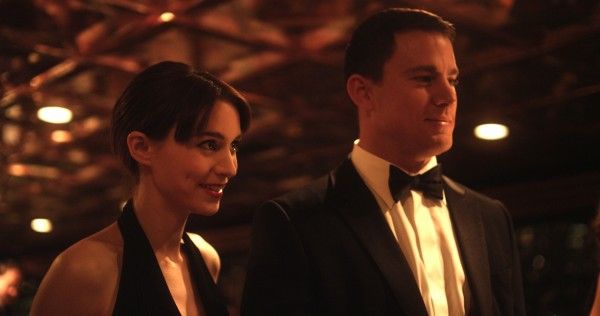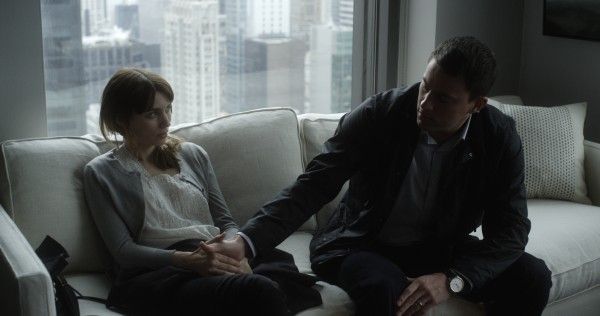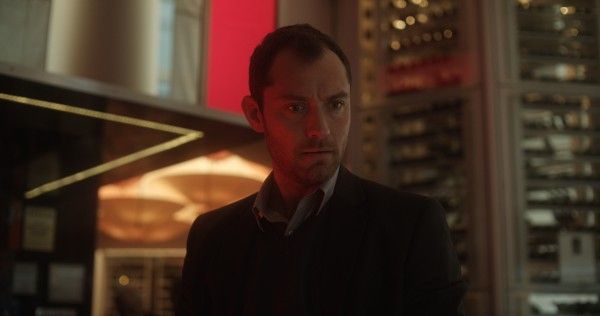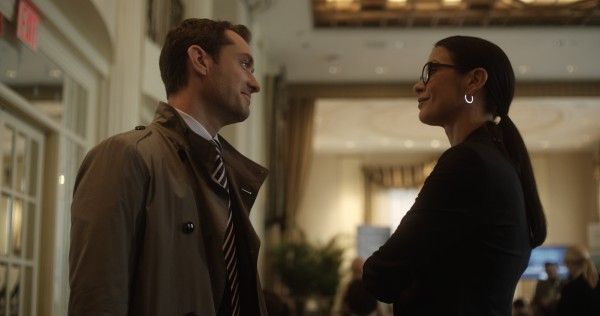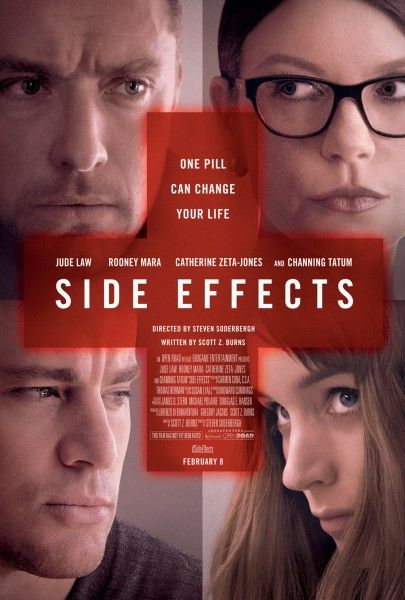Opening this weekend is director Steven Soderbergh’s psychological thriller Side Effects. Written by Scott Z. Burns (Contagion, The Informant!), the film is about “a successful New York couple (Rooney Mara and Channing Tatum) whose world unravels when a new drug prescribed by Emily’s psychiatrist (Jude Law)—intended to treat anxiety—has unexpected side effects.” The film also stars Catherine Zeta-Jones and Vinessa Shaw.
At the recent Los Angeles press day I landed an exclusive interview with Vinessa Shaw. While we were scheduled to talk about her work in Side Effects, we actually spent a lot of time talking about one of her other projects: Stanley Kubrick's Eyes Wide Shut (she played a small but significant role as an HIV-positive prostitute). As a huge fan of Kubrick (like all of you) I figured it would be cool to hear some behind-the-scenes stories about the making of his last film. Of course we also talked about Side Effects, her work on CBS' Vegas, and her next film, Electric Slide. Read or listen to what she had to say after the jump.
Click here to listen to the audio of this interview, otherwise the full transcript is below.
Steve: You worked with Stanley Kubrick.
Vinessa Shaw: Yes.
How did you get involved in that film?
Shaw: You’ll never believe it was just a very simple process I just auditioned. However during the auditioning process the movie was so under wraps, I don’t know if you remember back in the day, all you were allowed to say was a movie about sexual obsession and jealousy and even the casting the director had no idea about what the film was about, so even the people who had to find the actors had no information. Pretty much I auditioned with an alias name for my character with a kind of put together scene that wasn’t really the scene from the movie with a Japanese business man, not Tom Cruise’s character, so it was just very obsequious, the whole thing. I pretty much just had to do it, twice I was called in and I was hired off of tape because Stanley Kubrick didn’t fly anywhere and so I was hired off of this tape and that was it. It was really not exciting [laughs].
I definitely want to know though what was it like being on set working for him? Obviously that was his last film.
Shaw: Yes, this movie changed my life, really, because up to that point I was a child actor, I did kid’s movies and this was like the first real adult and real pithy character that I could have. And Stanley was a highly intelligent person and obviously had an amazing breadth of knowledge from music to, at the time I was studying sociology, he knew about all these social theorists I was studying and we had a dialogue about it. So the fact that I even had that kind of experience at such a young age was incredible. And then not to mention career wise I really realized this is what acting’s about, how you really delve into the character, you study it and write it and re-write it over and over again and figure out what the breath of it is. I had never experienced anybody like that. It was like rehearsing a play and doing an acting class all at the same time. It truly made me realize that there’s a beautiful process that can go on in filmmaking, like a fine artist could have doing painting or whatnot and it was that kind of internal arduous work that he brought about because he was such an intense perfectionist and made everybody around him just the same. We would only do like a million takes.
I was just going to ask you about that.
Shaw: Yeah, exactly, a million takes and it didn’t feel like anything, it felt like we had done it once because I was going into a whole other realm as an actor I didn’t understand. It was kind of like an athlete going into the zone, or what people express as that because I’m not that athletic, that was what I thought I experienced as an actor. It just changed my trajectory. I was going to school thinking I was going to do something entirely different, thought acting was just a hobby at that point, met Stanley Kubrick and was like, whoa, this can be an art form and you can really move people the way you do simply by acting. It’s not just something that’s fun to do afterschool which is what I thought of it as a child.
Do you remember what the average amount of takes was, because he was legendary for this, were most of them over 50?
Shaw: I think over 30 or 40, but there’s one that was the most I think he had ever done, it was the shot going in with the steadicam into the apartment and his producing partner Jan Harlan, he made this joke, he was like, “Ha ha you just beat out Full Metal Jacket for the most amount of takes in a movie he’s ever done.” And it was 70 takes. And I was like, “Are you kidding, we just did 70 takes?” I didn’t even notice, but at the same time I couldn’t believe that that’s how many takes somebody did, and that’s when things were still on film, so imagine how much film he burned doing that.
I’m going to move on to other things but I’m a huge fan of his obviously, between takes was he asking you for adjustments? Because Fincher does the same thing where he makes you do it again and again and again. I’m just curious was he directing you on each one?
Shaw: At first I thought, is he trying to wear me down as an actor? I thought like all the preconceived notions I have of this character, is he trying to get me to the basest of level with this scene? Because I would pick up a glass and move it and he, 30 or 40 takes later would say, “Did you do that before?” and I’m like, “I’ve been doing it every single time” and he was like ok keep doing that.” And then I started noticing how he was setting up every other shot and I noticed what he was he would look at; he looked first at the lighting, then the cameras, then the actors and it was multiple takes until it was perfect for each subject he was looking at. And so I was thinking, “Oh my god, he’s not even paying attention to anything I do until the 40th take” because he’s really just trying to get everything surrounding the actual actors and then he goes into that scene so it was- again he was a perfectionist at every bit of the filmmaking process and the actors happened to just be one of the later parts that he was paying attention to.
That’s, I think, a very astute observation. I really do wonder what he would be doing with digital filmmaking the way that Soderbergh has embraced it, but that’s a whole different-
Shaw: I think he would have. I asked Soderbergh about it and he said “I definitely think he would have embraced this new form of filmmaking, this new medium in that way.” And I was like “I don’t know he was so old school.” He started out as a photographer with look magazine, if he could get the lighting to be perhaps in that fashion it would work, but that was Soderbergh’s argument, you can.
I’ve talked to a lot of different filmmakers and every director is a little bit different. I think, personally, for low light situations digital filmmaking is amazing and I think more filmmakers down the road will do some film and other sequences with digital and mix it all together. I think a lot of people are so…it’s either this or that.
Shaw: Yeah, no yeah that’s true, I agree. I agree with that.
Jumping into why I’m actually getting to talk to you today now that I’ve wasted ten minutes.
Shaw: That’s not wasting.
Shaw: You know what I mean.
It puts me a in a really good place.
I could talk about Kubrick all day.
Shaw: Did you see the exhibit, sorry, I have to ask.
I’ve been out of town a lot.
Shaw: Oh yeah, you just got back.
I also was out of town before that too. It’s on my list of things to immediately do.
Shaw: You’re going to die, it’s so amazing.
Every person I follow on Twitter, all the filmmakers and all the people I know just keep tweeting picture from the exhibit, and they’re like, “Oh my god, look at this.”
Shaw: It’s great because it really shows his perfectionism as well as the genius of his use of color like every detail that he had- obviously because his family and probably Jan Harlan was involved with putting up the exhibit, and I just noticed Terry Semel is on the board at LACMA and I know they were good friends so I’m sure he pushed some of that too. Anyway, You’re just going to enjoy it so much, I wish there were like 400 more rooms of showing each and every bit of each and every film he did. It’s just too small for me actually. [Laughs]
I was just in London and I saw the Hollywood costume exhibit and that’s amazing, that’s going to be traveling to the States too. That will also blow you away when you see the costumes. It’s like a 21st century exhibit on what costume designers do.
Shaw: Wow.
And they have costumes from everything form The Wizard of Oz to The Matrix.
Shaw: No way.
It’s amazing.
Shaw: Where was that did you say?
It was in London and it’s going to be traveling the world.
Shaw: Nice.
When it comes to America everyone will be talking about it because it’s that- it embraces 21st century technology with monitors, and it’s very minimalist so everything that’s there is very important and worth reading. And it really explains the filmmaking process to the average person. It’s very well done. Getting into why I’m getting to talk to you today, how did you get involved with Side Effects?
Shaw: Well, again, I don’t know I guess I just have this simplicity as an actor to just really audition and get the part. [Laughs] I’ve yet to step over that step completely. Even though I worked with Steven a long time ago, I’m not sure whether I was like the top choice, so I auditioned for it and months went by and then it finally came back around, and so pretty much that was it. I auditioned and he watched the tape I don’t know how many times in between and then decided.
What is he like in terms of asking you to prepare for a role? Is he one of these people that gives you a lot of instruction, or is he one of these people that expects you to figure it all out and come to the set prepared?
Shaw: He is definitely more of the later, at least in my experience, however listening to some of the other actors today or along the way I think he adds a little bit more to- it’s his specificity for what he wants from each character according to the actor who’s playing it. For me, I don’t think he had any comments about how I would play it and so therefore he just trusted me to come to set and bring what I had to bring and make adjustments from there. Because pretty much what Steven does is he tells you something that’s very specific that he may want you to push further in a certain scene and he may just give you that one note in a whole scene and that’s it. He pretty much leaves actors alone and lets them explore the character. Unless he has something that he doesn’t like and then he just tells you to make an adjustment.
The thing about Steven, he’s like Del Toro where he will cut everything as he’s filming.
Shaw: Yeah.
So how much is he showing you on set sequences that he’s been cutting, or does he wait to the end?
Shaw: For me he waited to the end, obviously the final cut and when I saw it on screen. But we had one reshoot and he wanted me to come back and do the reshoot and he showed where we were just for continuity purposes. So I didn’t really see much of the movie being cut as he was going along. But yeah, it was incredible, you would have four hour days of shooting when usually it’s like twelve or thirteen hours and you’re completely exhausted as an actor. Yeah, he just had the minimal amount of time shooting and spent the rest of the time editing. I mean I’ve never seen anyone like that; he really has the image seared in his mind of what he wants. He’s flexible obviously to what unfolds in front of him on set but his image is pretty solid of the end result of what he wants to see on screen.
How much of this project changed along the way? Because I would imagine has a lot of creative freedom to do whatever the hell he’s going to do, did you get any yellow pages or pink pages or was it sticking to the script most of the time?
Shaw: There were times when I did come to set where Scott Burns and Steven had talked about the upcoming scene and they thought, “Maybe we could do it this way,” or “Lets add this sort of line.” For instance the scene where it’s, this doesn’t give away any plot points, the scene where I see the Banks couple kind of having an intimate moment interrupted by the kid saying he had a nightmare, they added that cute moment in the beginning to show some more intimacy but that was the day of just, “I got this job so maybe I can get a new shirt.” That kind of real sweet kind of funny moment, “Maybe I could take this shirt off of you.” Whatever the lines are. I think he’s very much in the moment; he goes moment to moment, so the day of, yeah, you’re usually getting an adjustment that could change and better the scene.
Before I run out of time with you, you’re also on a hit TV show right now. I haven’t seen the last episode or two so I don’t know if they’ve killed of characters or anything dramatic.
Shaw: I haven’t died, no. [Laughs]
Right, exactly. Talk a little bit about getting cast on Vegas.
Shaw: Vegas was a great show and a great opportunity because I really was interested in that kind of character. She’s a real ballsy woman from 1960; she has a lot of strength but obviously has to hide behind the decorum of the society of the times. I really enjoyed that. What was interesting was James Mangold who I worked with on 3:10 to Yuma, he wanted me to be a part of this project and of course I had to do the regular screen testing, auditioning, network testing thing that you have to do in order to get on any TV show, so I had to kind of go through that, but he’s always been a huge fan of mine and I of him so he wanted to work with me again. So he made sure that I was available and willing to do something like this and I’m really happy I did because I haven’t done much television and this kind of genre, it really sank in for me, I could easily do this character and understand her. It’s easy to step into those clothes and put on that air of social grace and enjoy having to be the good face to the bad guy. It’s been a fun ride so far.
It has a hell of a cast. That’s basically the reason I started watching, I was like, “Michael’s on this, yeah, I’m in.” You know? So what is it like working with this cast? It’s a big one.
Shaw: Yeah, mostly I’ve been working with Michael and Carrie-Anne Moss and it’s really fun because Michael and I have good chemistry, we can go toe to toe, which I think is fun. He can be very explosive in his acting and I love it, it’s so much fun because she’s not a wimp and she’s no slouch so she stands up to him. And Carrie-Anne it’s great because she’s a working woman in the 1960’s society and that’s kind of rare, she’s not married, those kinds of things that were a no-no back then. So she and I have this good rapport of people who are well educated women, who have their own motives, but are wanting to do what’s right and good even being on different sides of the track. It’s great because she’s so cool; she’s really down to earth, she’s far from this more conservative woman that she plays on the show. She’s a very hippie, down to earth lady, loves her children kind of thing. Same with Michael, he’s this kind of jokester, has a ton of stories to tell, and is not this angry, petulant person.
Yeah, I don’t think most people think that, although after The Shield, maybe.
Shaw: Yeah, I know, right? It’s so funny how you get cast for things that you’re totally not like. It’s been a good ride on that show.
I have to wrap with you but I definitely want to ask about Electric Slide, so who do you play in that? What’s it about?
Shaw: I play this woman who’s a shop girl with this Hollywood socialite turned bank robber in 1980. It’s a true story about this guy who actually swindled all these people, like Jack Nicholson was his best friend, and ended up being the most charismatic, famous bank robber known to people Los Angeles. He robbed, I think, over 100 banks and this was a time when it wasn’t security cameras everywhere you look, but still he managed to charm the pants off of every teller and they gave him money time and again, he would re-rob places and they would give him the money. So she’s kind of this woman who works at his antique shop and watches him spiral down into a crazy, hellish state. Because he’s succeeding at this horrible thing of robbing banks, he’s spending all his money and takes a turn for the worse. It really is a slice of life or a look into a guy who’s obsessed over being liked and wanting to fit in to Hollywood society and would do anything to make it happen. She’s kind of the moral voice of the story, his best friend who really can’t support him in that effort anymore and tries to help him, but it’s almost too late.
Side Effects is now in theaters. Click here for our exclusive interview with Jude Law.

